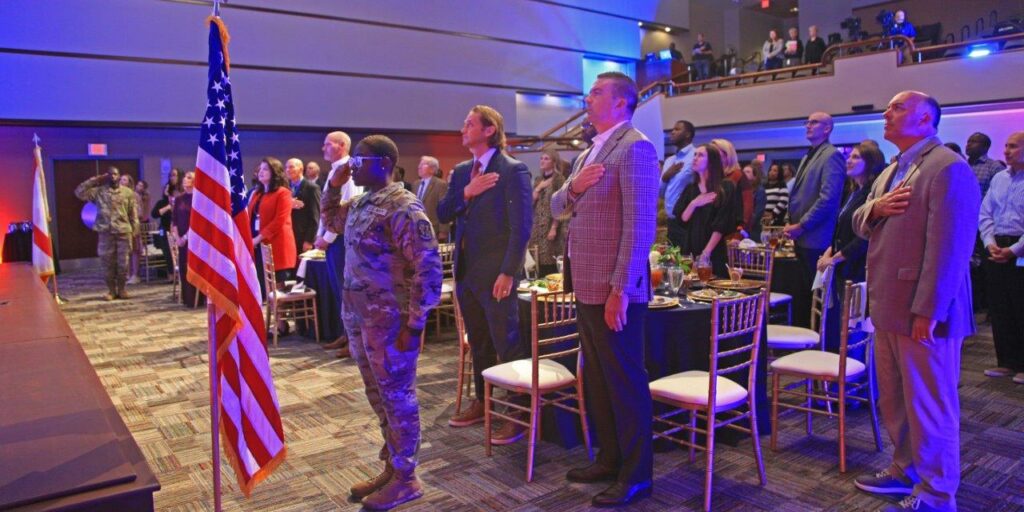“Ladies of the Jury” is like many great plays. It blends fact and fiction, relies on memory and imagination, touches on themes of great importance and connects deeply to a person or place.
In this case, that place is Andalusia in Alabama’s Covington County. It tells the true story of the first time women were seated on a jury in the state. The memory and imagination of playwright and Andalusia native Marianne Merrill Weber are the necessary ingredients that fleshed out the story into a play.
And the important themes? Since it takes place in small-town Alabama in the 1950s, there are many.
‘Ladies of the Jury’ tells the story of historic moment for women in Alabama from Alabama NewsCenter on Vimeo.
“You know, we think about the times as being ‘the good old days,’ well, were they? The big movements of the ‘60s hadn’t smacked us in the face. We didn’t know what was around the corner,” Weber said. “I think in many ways that was a precious time and I sought to recreate that with the play – with the conversations, with the things that were discussed. A lot of things that are mentioned in the play are not necessarily resolved because they were not resolved at the time.”
In a few short days, “Ladies of the Jury” will have its world debut in Andalusia where it is being directed, produced and performed almost exclusively by actors from Covington County. It tells a story of significance to the state and touches on themes important to us all. The play will be held at the Andalusia City Hall auditorium April 22-24. Tickets can be purchased here.
Roger Powell is directing the play. As someone who has acted and directed plays in Andalusia for years and worked at the county courthouse for more than three decades, he seemed destined for the job.
“There was just something about the story that it was unique to not only this county, but the state of Alabama,” Powell said. “And the foresight that the judge had at the time to think of this idea.”
Though it was not a criminal case, Judge Bowen Simmons pulled six women off the voter rolls to sit on the advisory jury along with six clergymen to hear a heated custody case in 1955. Alabama ratified the 19th Amendment to the Constitution on Sept. 8, 1953, so voter rolls were slowly adding women. Juries are often selected from voter rolls.
“As I talked, I realized how many of the women on the jury, and the men, had relatives that I know,” Powell said.
He learned that one of the women he went to church with had served on that jury.
“I’ve read it multiple times and the more I’ve read it, the more I realize Marianne, in writing this, covers a lot of things that were happening in the ‘50s, a lot of issues,” Powell said. “And I’ve told my cast, we’re still struggling with a lot of those issues today. We’ve come a long way, but we haven’t come far enough.”
Powell wasn’t the only one drawn to the play.
A circuit court judge is playing Judge Simmons and one of the lawyers in the play is an actual lawyer. One of the actors playing a male juror is the actual son of one of the male jurors from the case.
The cast is varied – some with acting experience and others who have never been in a play before. Perhaps they feel a natural connection to the characters because they are so familiar.
Andalusia memories
Before tapping into her imagination, Weber was able to tap into her own memories. She grew up on College Street in Andalusia and thought back to the people she knew and what life was like in Andalusia at the time.
“I just knew so many people, fabulous women that were always involved in something in this town,” Weber said. “They were just running everything, whether it was club meetings, something at school, Sunday school – anywhere they could be involved, it was important to do that. That’s what I want to draw on.”
Weber learned about the historic moment from a story in the Andalusia Star-News newspaper commemorating the event and was fascinated and eager to learn more about the case. An Andalusia mural honoring law enforcement that includes the female jurors was one of the only reminders of the case until Weber decided to write the play.
“I just really came up on dead ends everywhere I turned,” Weber said. “So many years had passed, even digging in the basement of the Covington County Courthouse didn’t produce the transcripts and the documents I needed. The people involved were dead and gone, so it was sort of a ‘well, now what?’ Well, the ‘now what’ was this story is so precious to this town.”
So Weber took the basic facts of the case, knowing some details and the outcome, and built a play around them.
“If you’re going to write a story about Andalusia, there are probably many, many things you can find,” she said. “But this was unique.”
“Ladies of the Jury” isn’t Weber’s first play.
“Jonathan Myrick Daniels: The Martyr of Lowndes County” tells the story of the Virginia Military Institute (VMI) valedictorian and Episcopal seminarian who was killed in Hayneville at the age of 26 while protesting for civil rights. VMI presented the play in 2015.
Weber has also written a play based on the book “Guests Behind the Barbed Wire” by Ruth Beaumont Cook, which tells the story of German prisoners of war at a prison camp in Aliceville, Alabama, during World War II.
Weber has penned a play about Zelda Fitzgerald and her fiery relationship with F. Scott Fitzgerald. The two authors were married and lived in Montgomery for a time.
Weber also authored “Truman Capote’s Southern Years” under the name Marianne M. Moates. It’s a book that tells stories about the famed author’s time in Monroeville and his relationship with Harper Lee. Weber, who now lives in Prattville, had lived in Monroeville for a time.
She said “Ladies of the Jury” is the favorite of the plays she has written because it took place in what she considers her hometown.
“I thought this is far too fabulous a story to just let die,” she said.
Though she was limited in what was actually known about the case, Weber got to a point where she felt like she had enough to work with.
“I was satisfied that I had a whole story that I could tell with the play and then with the different people and the times, it just seemed perfect for an Andalusia story,” she said. “This is our story.”
Once the play was written, Weber wanted to have a reading among people in Andalusia to get their thoughts and feedback and make sure it fit with the history of the town. Powell was there and he immediately felt a production of the play was doable and he wanted to direct it.
Just as things were getting rolling, the pandemic hit. After a two-year delay, the debut is finally a few days away.
Weber has attended rehearsals and offered input and answered questions from the cast members to help flesh out the words on the page. She’s pleased that the parts she intended to be funny are creating laughter and the parts that are intended for contemplation are hitting that mark.
“To see it come to life and the way they portray the people that sort of were in my mind has been so satisfying,” she said.
Preparing the play
“I have hats!”
The announcement echoed in the rehearsal space at First Presbyterian Church of Andalusia.
A recent partial dress rehearsal included a box that one cast member apparently found after rummaging through a mother’s or grandmother’s attic. In it were hats that women might have worn at the time of the play. Cast members tried on the hats and began to get into character.
Powell wrangled the cast into their places and the church’s art room briefly became a 1950s-era county courthouse as the humor, drama and issues of the case came to life off the page.
Weber sat watching her work acted out with a broad smile on her face.
A new arts organization, ReAct Theatre & Arts, is presenting the play. Special events are planned around opening night and the final matinee.
“We’re considering this a world premiere, so on Friday night we’re having a big after-party,” Powell said. “On Sunday afternoon, we’re having a talk-back after the show with the cast and anybody from the audience that wants to come down front and talk with the cast and with Marianne about it.”
Weber and Powell want the play to not only entertain, but to provoke thought.
“I hope that they will understand that this was a significant event, and it was pretty historic,” Powell said. “There are just a lot of issues she addresses in her play. She addresses civil rights, integration and segregation, voting rights, women’s rights above all else.”
Weber said she wants audiences to think, question and maybe even have their eyes opened.
“I hope they will think about some things that I brought out in the play,” she said.
She also wants to instill the pride she feels that something so important happened in her hometown.
“I hope they will come away with a smile and think, ‘Oh, this is so great for our town!’ That’s my big hope.”
(Courtesy of Alabama NewsCenter)










